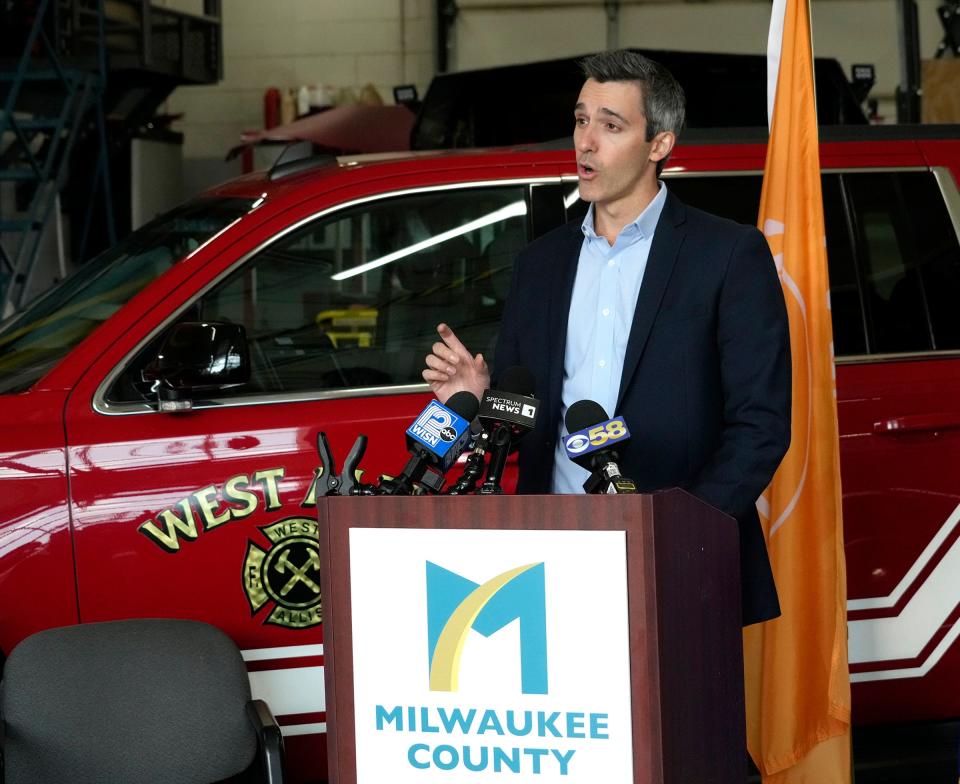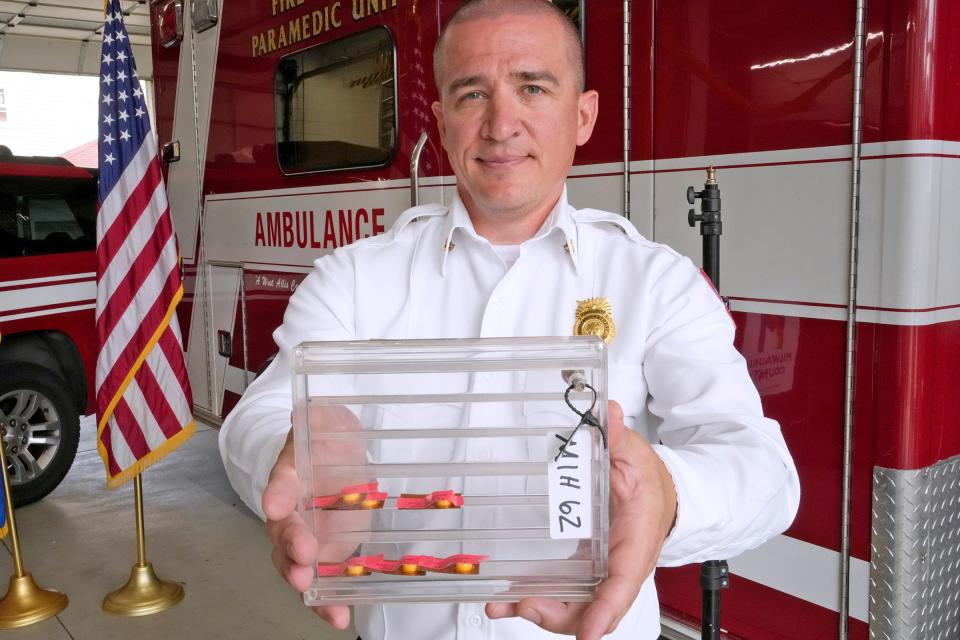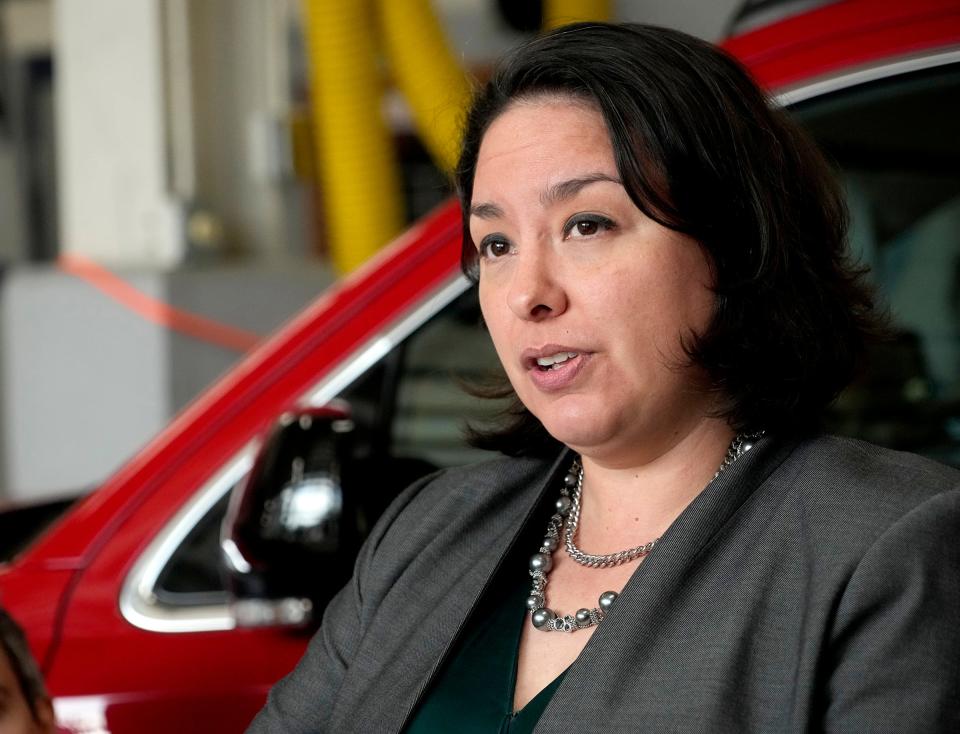New West Allis program will allow first responders to initiate long-term opioid treatment
Recovery from addiction is possible. For help, please call the free and confidential treatment referral hotline at 800-662-HELP, or visit findtreatment.gov.
The West Allis Fire Department announced a new treatment program Tuesday that officials believe will be the first in the state to allow first responders to administer a key medication used in long-term treatment for opioid use disorder.
Through a partnership with the Medical College of Wisconsin and Milwaukee County, specially trained members of the fire department's emergency medical personnel will be able to give people an initial dose or doses of buprenorphine, carrying them through a few days while the person gets into longer-term treatment.
The medication works by lowering withdrawal symptoms, preventing overdoses and lowering the "high" a person experiences when taking opioids, said Ben Weston, the county's chief health policy adviser and the medical director of the Office of Emergency Management-Emergency Medical Services. Like methadone, it is used to over time lower a person's dependence on opioids.

Buprenorphine is approved by the U.S. Food and Drug Administration for treating opioid use disorder. While buprenorphine has been available through various treatment programs for some time, the fire department's program is a relatively new path through which people can access the medication.

Through a three-year, $900,000 grant from the U.S. Department of Justice, specialized first responders will be able to offer the pill on scene, just as they are able to administer Narcan, which reverses overdoses. The department's community paramedic and a peer counselor will then work to connect patients to longer-term treatment options through their doctor or another substance use disorder treatment center.
The COVID-19 pandemic saw a record rise in the number of opioid-related overdoses and deaths. In 2022, Weston said, someone in Milwaukee County died of an opioid overdose every 16 hours. So far in 2023, the data is "strikingly and disappointingly similar," he said.
West Allis was no exception to these trends, said Jason Schaak, the fire department's assistant chief of community risk reduction.
At its peak in 2020, the city saw an average of 160 overdose incidents and 45 opioid-related fatalities. While the overall number of overdose incidents fell 28% in West Allis between 2019 and 2022, Schaak said, the number of deaths has remained steady, possibly due to the rise in the use fentanyl, which can be especially deadly.
West Allis among the first in the nation
While there are a few other programs nationwide that allow emergency medical personnel to start people on buprenorphine, the approach is still relatively new.
Weston said the loosening of FDA rules around the use of the medication have made it easier to get it into the hands of people who would benefit from it. As more people have gotten the treatment, heath care professionals realized that the medication can be safe and has few side effects.
"When studied in emergency department settings, patients given buprenorphine were twice as likely to stick with treatment programs as those without the treatment," Weston said. "These patients given buprenorphine were also less likely to use illicit opioids. They were less likely to spread HIV or hepatitis. They were less likely to overdose. And, ultimately, they were less likely to die."
More: Drug overdose deaths in Milwaukee have doubled in the past decade. Here's how you can respond.
The program is just the latest in a series of county efforts to address opioid deaths. Jeremy Triblett, behavioral health prevention coordinator for the county Department of Health and Human Services, also pointed to new vending machines around the county that are stocked with free Narcan and fentanyl test strips, and BetterWaysToCope.org, where residents can access education and community resources for addiction treatment. The first machine was installed in March on the first floor of the Marcia P. Coggs Human Services Center, 1220 W. Vliet St. The county plans to place one in each of 19 municipalities this year.

The effects of opioid use disorders can be felt through entire families, Triblett said. Between 2018 and 2020, 80% of overdoses in the county occurred within residential spaces.
"That tells you that this is an issue that impacts nephews and children and grandparents. We're talking about all of them being directly impacted by overdoses," he said.
Already, Schaak has seen the benefits of the fire department's program. A few weeks ago, the department responded to a resident who had overdosed. First responders administered Narcan. After that, the resident began to experience severe withdrawal symptoms.
“It’s been described as absolutely excruciating, and in this situation, patients may refuse to go to the hospital and instead turn to continued drug use to find relief,” said Schaak.
Yet, after a single dose of buprenorphine, Schaak said, the resident’s withdrawal symptoms subsided. The resident met with a community paramedic the following day to enroll in a long-term recovery program.
It can be scary to start treatment, especially for people who are not comfortable interacting with the formal medical system, said Dr. Jennifer Hernandez-Meier, an assistant professor of emergency medicine at the Medical College of Wisconsin who is providing medical expertise to the program and will help measure its impact.

"Hopefully, the community paramedics and the EMS staff are seen as trusted resources," Hernandez-Meier said. "If individuals aren't willing to engage in other ways, this is just another option. Another time that they're being asked. You never know when someone's going to finally decide that today's the day."
If you or someone you know is struggling with substance use disorder, here's where you can find help
For those struggling with substance use disorder, and their friends and families, it can be difficult to reach out for support. There are programs in Milwaukee County and in Wisconsin that can provide help for recovery.
To find resources in Milwaukee County, call 211 or the Wisconsin Addiction Recovery Help Line at 833-944-46473. For Milwaukee locations to receive an evaluation and treatment, visit the health department's website for a list of facilities or call 414-257-8085.
If you need help with mental health or a substance abuse issue, the Milwaukee County Behavioral Health Division has a crisis line at 414-257-7222.
If you're a family member or friend looking for support, Nar-ANON, a local group, can provide resources.
To find resources in Ozaukee and Washington County, visit changetheend.com.
For coping strategies and other community support, visit BetterWaysToCope.org.
Contact Devi Shastri at 414-224-2193 orDAShastri@jrn.com. Follow her on Twitter at @DeviShastri. Megan Woolard can be reached at MWoolard@gannett.com or on Twitter @MeganWoolard4.
This article originally appeared on Milwaukee Journal Sentinel: West Allis EMS to offer medicine that helps treat opioid addiction

